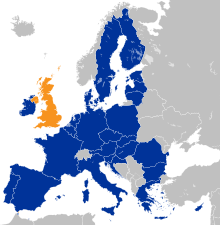This article needs to be updated. (May 2021) |

| Part of a series of articles on |
| Brexit |
|---|
 |
|
Withdrawal of the United Kingdom from the European Union Glossary of terms |
Trade negotiations between the UK and the EU took place after Brexit between the United Kingdom and the European Union for a trade agreement to make trade easier than it might have been without such a deal. The deal would cover both tariff and non-tariff barriers to trade. The negotiations formally ended on 24 December 2020 with an agreement approved in principle by the UK Prime Minister (on behalf of the UK) and (on behalf the EU) the President of the European Commission.[1] The result was the EU–UK Trade and Cooperation Agreement (TCA).
Having left the European Union on 31 January 2020 with an eleven-month transition period, the United Kingdom left the European Single Market and European Union Customs Union with effect from 1 January 2021.[2]
During the Brexit negotiations in 2017 (of the withdrawal agreement), the two sides agreed that trade negotiation could only start after the UK's withdrawal, because such negotiations could not happen when the UK still has a veto right within the EU.[3] For this and other reasons, a transition period after Brexit day was defined to allow those negotiations. The transition period started on 1 February 2020, in accordance with the withdrawal agreement. The transition period was scheduled to end on 31 December 2020, a deadline which could have been extended for two years, if requested by 30 June 2020.[4] The British government declared that it would not apply for any such extension,[5] and did not do so. In addition, it declared that the only kind of trade deal the UK is interested in, if any, is a Canadian-style trade deal.[6][7] A trade deal facilitates EU–UK trade, which accounts for 49% of international UK trade.[2] A Canadian-style trade deal offers the UK a reduction on most custom tariffs between the EU and the UK, but without eliminating VAT, customs and phytosanitary checks.[2] The arrangements for its dominant financial services sector are of particular importance to the UK.[6]
- ^ "UK and EU agree Brexit trade deal". The Guardian. 24 December 2020. Archived from the original on 29 December 2020. Retrieved 24 December 2020.
- ^ a b c Edgington, Tom (2 March 2020). "Which countries does the UK do the most trade with?". BBC News. Archived from the original on 5 May 2021. Retrieved 24 February 2020.
- ^ Foster, Peter (29 April 2017). "EU Brexit guidelines: What's in the document, and what it really means". The Daily Telegraph. Archived from the original on 2 April 2019. Retrieved 14 May 2017.
- ^ Sandford, Alasdair (11 February 2020). "Post-Brexit Guide: Where are we now? *latest updates*". euronews. Archived from the original on 25 February 2020. Retrieved 28 February 2020.
- ^ "UK will not extend Brexit transition period – Johnson's spokesman". Reuters. 6 January 2020. Archived from the original on 29 March 2020. Retrieved 8 March 2020.
- ^ a b Briançon, Pierre (11 January 2018). "Brexit trade deal will contain financial services, but UK may not like it". POLITICO. Archived from the original on 24 February 2020. Retrieved 24 February 2020.
- ^ "Slide presented by Michel Barnier, European Commission Chief Negotiator, to the Heads of State and Government at the European Council (Article 50) on 15 December 2017" (PDF). European Commission. 15 December 2017. Archived (PDF) from the original on 5 February 2020. Retrieved 8 March 2020.
© MMXXIII Rich X Search. We shall prevail. All rights reserved. Rich X Search
